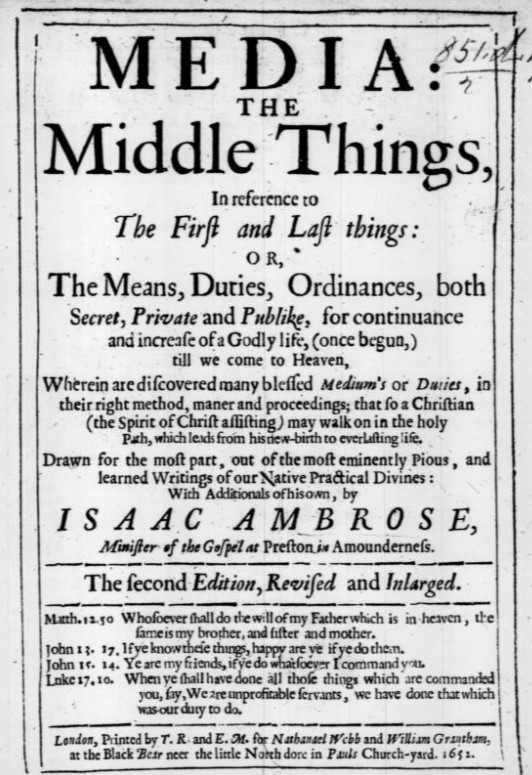A scene from the Leben der heiligen Altväter (1482)
Wesley’s Christian Library Vol 8
Vol 8 Contents
- Extracts From The Works Of Isaac Ambrose
- The Practice of Sanctification
- Chapter I: The Entrance
- Of Duties
- In General Of Self-Denial
- Of The Life Of Faith
- Of Family Duties
- Looking unto Jesus: Or The Soul’s Eying Of Jesus
- Books 1 to 6 (to his resurrection)
- The Practice of Sanctification
Description & Discussion

Isaac Ambrose (1604-1664) was introduced in volume 7, where his extracts began. Wesley has taken apart Ambrose’s three-book project Prima, Media, & Ultima. He has already deployed material from the Prima section as a discussion of regeneration in volume 7; now he turns to the Media section here in volume 8 for a discussion of “the practice of sanctification.” (He will not use material from the Ultima section at all, even though in that section Ambrose maintains his focus on soteriology, continues to do Practical Divinity, and does not switch to general eschatology.) The Practice of Sanctification seems to be Wesley’s own new section title for this material; it is not evident in Ambrose. But in its own way it faithfully deploys Ambrose’s material toward a similar goal, especially highlighting the turn from regeneration to the life of faith.
Ambrose published Prima and Ultima separately in 1640. Media came out in 1650, with a significant revision in 1652. Perhaps because Ambrose was rounding out a three-part comprehensive series, and perhaps because the central section of the series had so much ground to cover, he designed Media as a kind of anthology of recent English spiritual writing. Ambrose’s Media was in fact a kind of Christian Library with some striking similarities to what Wesley would undertake a century later. In an eight-page notice “To The Reader,” (not reproduced by Wesley), Ambrose notes the flood of book publishing and asks, “How should a Christian furnish himself with a sufficient Library, to help him on in his way Heaven-ward? Should he buy up all the Ancients, or (in case he want the Tongues) should he buy up all our Modern English Writers, Positive and Polemical, they might fill his Closet, but he should finde no end of buying, as there is no end of making Books.” Even if one were to read them all, their disagreements would tend toward confusion rather than edification. “To prevent this, some have advised Christians to choose out, amongst that world of variety we now enjoy, such Authors as are most suitable to their Genius and Imployment.”
Who are these “some?” Ambrose mentions Francis Bacon (under his title Lord Verulam), who, “with some others,” have said that “if the choyce and best observations, which have been made dispersedly in our English Sermons (leaving out the largeness of Exhortations and Applications thereupon) were set down in a Continuance, it would be the best work in Divinity that hath been written since the Apostles; times.” (Perhaps here?) And George Hakewill (1578-1649) here made this extravagant claim to recent progress even more explicit:

It certainly seems boastful to claim such great accomplishments (“since the Apostles”!), and Bacon and Hakewill may be guilty of naive addiction to an optimistic providential progress narrative. But Ambrose and Wesley are in substantially in agreement with them: recent English spiritual writing makes 1650 or 1750 a golden age of practical divinity, ripe for harvest! Ambrose: “Indeed had we such a Book extant, I would advise the Christians of our Age to buy the Bible; and that Book, and to study them, and no more, as to their Spiritual good.” For this reason, in his treatment of sanctification, Ambrose’s Media is by design a collection of the best ideas and language of the choicest authors:

One implication of this for understanding Wesley’s A Christian Library is that ACL is double-distilled; it has incorporated into itself some works that have already incorporated into themselves the best of other works. Another implication is that John Wesley was taking advantage of a providential opportunity that several others had noted fairly recently.
Chapter I: The Entrance:
Of Duties
In General Of Self-Denial
Of The Life Of Faith
Of Family Duties
Looking unto Jesus: Or The Soul’s Eying Of Jesus
 Fred Sanders
Fred Sanders

